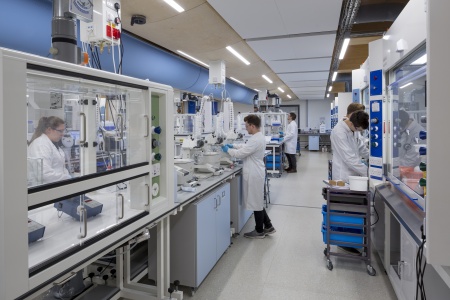
March 4, 2019, by jicke
Undergraduates join the fight against malaria with new drug discovery programme.
The University of Nottingham has embarked on a new drug discovery programme within its School of Chemistry to help in the fight to treat malaria, one of the world’s deadliest diseases.
In an extension of the longstanding collaboration between the School of Chemistry and GSK, fourth year undergraduates from UoN have started work on a new series of compounds that could provide a starting point for future optimisation work leading to a potential treatment for malaria.
Dr Andrew Nortcliffe, Teaching Fellow in Medicinal Chemistry, University of Nottingham, School of Chemistry, said: “A child in Africa dies every minute from malaria and our collaboration with GSK provided our students a unique opportunity to work directly with GSK scientists to access world-class expertise and tools with the united goal to develop medicines for this debilitating disease. We hope that this research will contribute towards the global efforts to eradicate malaria by 2030.”
Collaboration for new treatments
The original collaboration began in 2010 as a module for 3rdyear undergraduates, and this was extended to a drug discovery research project into idiopathic pulmonary fibrosis – a life threatening lung disease, in 2011. As a continuation of the innovative partnership with GSK, the School is now joining forces with GSK scientists based in Stevenage UK and Tres Cantos in Spain in an effort to discover new treatments against the parasite that causes malaria.
The research is co-led by Dr Simon Macdonald, Director of Medicinal Chemistry and Dr Marga Puente-Felipe Senior Scientist both from the Fibrosis and Lung Injury Discovery Performance Unit at GSK. It is carried out in partnership with Tom McInally, Business Science Fellow at the University of Nottingham and Professor Chris Moody, Sir Jesse Boot Professor and Director of the EPSRC CDT in Sustainable Chemistry.
A group of undergraduate students are taught how to analyse and use the structure-activity relationships generated in the project to design novel compounds. Synthetic chemistry is subsequently carried out over two 10-week terms and biological and physicochemical screening data of the new compounds is generated by GSK in the UK and in Spain. The research will be carried out in the new GSK Laboratories for Sustainable Chemistrybased on Jubilee Campus.
The teaching initiatives with GSK have inspired the next generation of UK scientists, giving them insights into the pharmaceutical industry and the multi-disciplinary science that goes into developing a new medicine.
No comments yet, fill out a comment to be the first

Leave a Reply